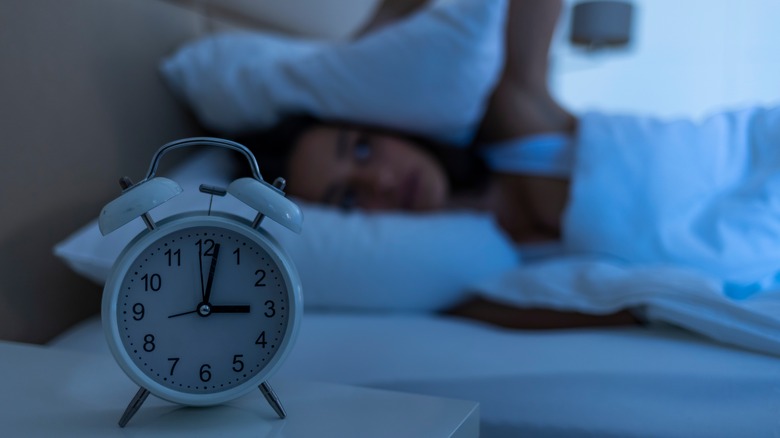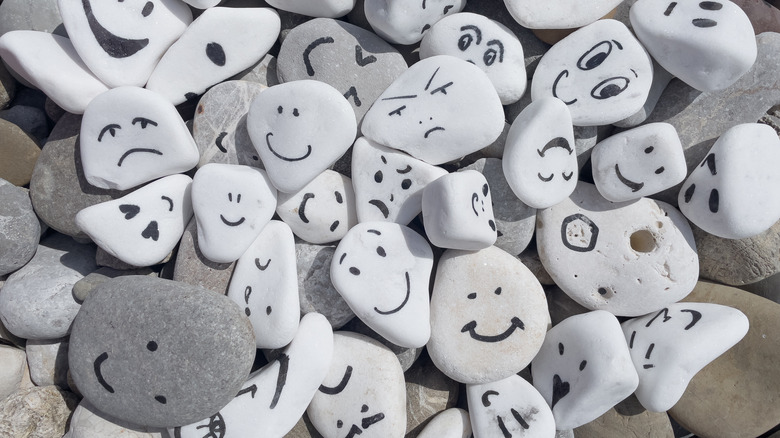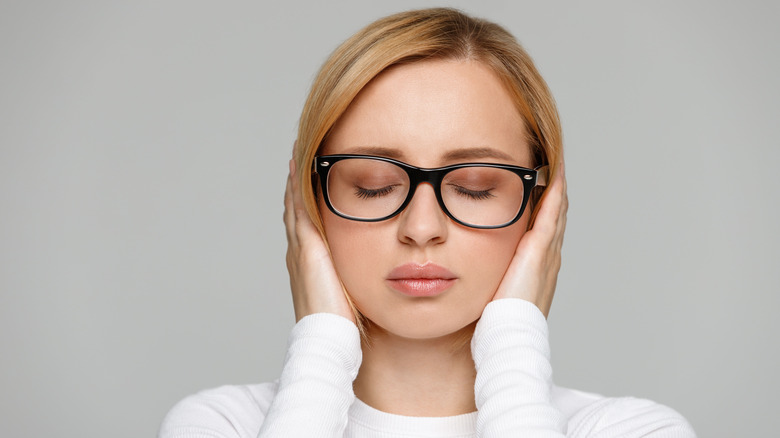Socially, the awareness of mental health issues is having a moment, and we are so here for it. Even pre-pandemic whisperings of mental health awareness and advocacy were popping up across social media. Now, nearly two years into a time in which many people feel more isolated than ever, the whisperings about mental health have turned into shouts of concern for our collective mental well-being. Because mental health is becoming less taboo as people outwardly discuss the trials and tribulations of regular therapy, it has become a defining topic of conversation in our current zeitgeist. It finally feels like mental health is being brought out of the shadows and into spaces where true advocacy and help can be garnered.
Depression is one of the more well-known mental health afflictions and is certainly not a condition to be taken lightly. When left untreated, around one in every 10 people with depression die by suicide (via WebMD). The signs of depression are not always linear and can be insidious in nature. There are plenty of signs of depression that, frankly, should not be ignored.
If you or someone you know is struggling with mental health, please contact the Crisis Text Line by texting HOME to 741741, call the National Alliance on Mental Illness helpline at 1-800-950-NAMI (6264), or visit the National Institute of Mental Health website.
Fatigue

Fatigue is a symptom of depression that is all too easy to overlook. After all, spending the majority of your waking hours working, chasing children, completing tasks, or whatever else your day might consist of is enough to leave you tired. But there is more to depression-related fatigue than just feeling tired. Unfortunately, fatigue can feed the cyclical nature of depression, and depression can feed the overwhelming feelings of perpetual fatigue.
Depression can feel like it is sucking your life-force energy out from inside of you. These feelings of fatigue can trickle into other areas of life and illuminate some of the other symptoms of fatigue. For example, your lack of energy may lead to feelings of disinterest in things that used to light you up. If you are unsure about the root cause of your fatigue, Psychology Today recommends taking stock of how your energy levels may have changed over time. If small tasks are taking you longer to complete or require more effort, depression may be part of the reason.
Loss of interest

Experiencing a loss of interest in activities and things you used to enjoy can be a disorienting and disheartening experience. While many people opt to distract themselves by engaging in hobbies they love in order to cope with unexpected loss, grief, and other unpleasant human emotions, people with depression often do the opposite. The loss of interest can be born of a general feeling of malaise or fatigue, but also as a side effect of the sadness that people with depression tend to feel on a daily basis (via the Mayo Clinic).
The American Psychiatric Association explains that if a loved one who used to enjoy certain hobbies suddenly loses interest in them, it should act as a red flag. If a sudden loss of interest is something that you experience in your own life, it could be cause for concern as well. The sooner you seek help regarding the emerging symptoms of depression, the higher your chances of regaining a healthful quality of life.
Sleep disturbances

Dragana Gordic/Shutterstock
Sleep disturbances can occur and fuel depression-related fatigue, or they can exist as a symptom of depression on their own. Much like some of the other symptoms of depression, sleep complications can provoke a worsening of depressive symptoms as fatigue becomes more chronic. Insomnia is often a side effect of depression, which can ruin sleep night after night. When this is the case, anxiety can start to run rampant and increase the severity of the depressive symptoms. Healthline suggests that insomnia that is driven by depression may be a result of brain chemistry imbalances.
On the flip side of the sleep disturbances coin is excessive sleeping. The fatigue a person with depression experiences may lead to regular oversleeping, which ultimately causes further disruptions. There are quite a few other mood disorders that can cause disruptions in sleep patterns. If you are experiencing unusual sleep patterns, it is best to visit your doctor to decide how best to move forward.
Anxiety

PitukTV/Shutterstock
Depression and anxiety are two mental health afflictions that often exist side by side. According to Healthline, neither has been shown to cause the other, but they often exist congruently. In fact, nearly half of the people diagnosed with depression are also diagnosed with some type of an anxiety disorder (via Anxiety & Depression Association of America).
Anxiety most often presents with multiple physical and emotional symptoms that are most noticeable to the person experiencing them, naturally. The less outwardly visible symptoms include feelings of restlessness, nervousness, tension, panic, and dread. Anxiety can cloud one’s ability to think clearly, often resulting in a fixated focus on the one thing they are worried about. A person experiencing anxiety might feel their heart beating rapidly. Their breathing patterns might be quickened and shallow, and they might be sweating for seemingly no reason. Their body might shake or tremble as a result of muscular twitching (via Healthline).
Appetite changes

Nicoleta Ionescu/Shutterstock
Appetite changes can be linked to depression, and much like some of the other common symptoms, there isn’t necessarily a straightforward approach when it comes to looking at this symptom. In some people with depression, it can mean overeating on a regular basis; for other people with depression, an appetite change might look more like a loss of appetite. In an interview with Everyday Health, expert Dr. Gary Kennedy, Montefiore Medical Center in Bronx, New York, explains that a sudden loss of appetite can often be seen as one of the early signs of depression or recurrent depression.
Changes in appetite as a result of depression can be linked to feelings of fatigue and loss of interest in day-to-day activities as well. The fatigue a person with depression feels might discourage them from summoning the strength to prepare a meal. If a loss of interest is present, you might neglect cooking because the experience no longer brings you any joy or satisfaction. Conversely, emotional eating or “emotional hunger” is essentially eating in an attempt to fill an emotional void. Consuming food in this way can help soothe unpleasant feelings, which is why it becomes appealing. No matter which direction this symptom takes, a stark change in appetite or change in your relationship with food is cause for concern (via Everyday Health).
Super boost in energy

Cryptographer/Shutterstock
While an increase in energy sits in stark contrast to the previously discussed symptom of fatigue, it is nonetheless a symptom of depression worth discussing. Not all types of depression present as feelings of lethargy and withdrawal; this is important to note, especially when it appears as unusual behavior from a friend or family member. Psychology Today describes high-energy depression as a defense mechanism that people develop to prevent them from feeling the pain of negative life experiences. In many cases, an energetic person who has depression may be using high activity levels to mask their depression, sometimes even to themselves.
A person with depression might develop high-energy defense mechanisms because it makes them feel useful and productive. These individuals ward off the pain of depression by focusing on productivity instead of feelings of negativity. In the long run, this coping mechanism can leave people feeling over-committed and exhausted, ultimately leading to worsened depression.
Irritability

fizkes/Shutterstock
Irritability is a prime symptom of depression to look for in other people because it might be fairly easy to pick up on. It may also be one of the signs you begin to recognize in yourself. If you find yourself tiptoeing around someone who used to feel like a safe person to be genuine around or vice versa, it is likely worth investigating. While other elements could lead to feelings of irritability, Psychology Today recommends taking a closer look. Instead of defaulting to blame your stress level at work or other standard life things, they recommend examining the true source of the irritability to determine if the cause could be deeper.
Since depression is felt so differently by so many people, it is important not to discount the various ways in which it shows its head. While many people experience the more classic, lethargic, and hopelessness-style of depression, for many others, it can show itself as irritability and bouts of anger.
Uncontrollable emotions

IrinaMonte/Shutterstock
The human experience is fraught with highs and lows. The rollercoaster of emotions you feel as you move through life is normal, provided that these emotions do not overwhelm you or hinder your abilities to move through your daily life. When the emotional swings become erratic and unpredictable, some concerns should begin to mount. As explained by Healthline, bouts of sadness resulting from a tragedy or other sad life experience are unfortunately par for the course.
Frequent mood shifts and the subsequent urges that follow should be monitored carefully. For example, inexplicable and uncontrollable energy that turns into days of suicidal thoughts or the inability to get out of bed should raise huge red flags regarding mental health. Of course, violent swings in mood can signify underlying depression, but also a multitude of other mental health complications. If this is something you are experiencing, it is better to seek help sooner than later (per Healthline).
Hopelessness

fizkes/Shutterstock
Hopelessness is one of the most recognizable symptoms of depression. It’s one of the hallmark symptoms because of how slippery it is — once you are sliding down this path, it might seem impossible to stop the momentum. Hopelessness and helplessness are often the key attributes that make up for a person with depression’s worldview. They may say things like, “What’s the point?” But there is a definitive line between a nihilistic and meta-conversation and the rabbit hole of hopelessness that many people with depression find themselves in (via Healthline).
A hopeless outlook on life can also come with a side order of feelings of worthlessness, self-hatred, and guilt. Sometimes, these feelings can spiral into meta-emotions, which are essentially feelings that you have about the feelings that you’re experiencing. While not all meta-emotions are negative, they often are in the case of depression. A specific example of this is when a person with depression feels embarrassed or guilty about their depression. Thus, a vicious cycle can ensue (via Healthline).
Gastrointestinal issues

Doucefleur/Shutterstock
While an upset stomach and bowel movement complications might not be the main symptoms you think of when considering symptoms of depression, it turns out that gastrointestinal health is directly correlated with depression and mental health. According to one study, the connection between GI health and mental health has been observed in clinical trials but also within population samples, which further confirms the link between the two. This study cites “pathophysiologic mechanisms” as the factor that ties your gut and mental health together. Pathophysiology can be loosely defined as unusual changes of a particular physiology (via Merriam-Webster). This is to say, atypical physiological processes are at the root of both complications.
Harvard Health has conducted research to confirm that brain activities have a direct impact on the health of your gut. The example they give is thinking about eating, which can provoke your stomach to release juices before you even consume anything. On the flip side, issues within the GI tract can send signals to the brain, which lead to feelings of anxiety, depression, and stress. Experts find mental health to be one of the causes of seemingly unexplained and sometimes chronic stomach issues.
Aches and pains

Prostock-studio/Shutterstock
Much like the invisible link that tethers mental health and your gut, there is a link that binds depression and the physical sensations within the body. Aches and pains with no tactile cause can be another symptom of depression that should not be overlooked. Healthline reports that feeling physically fine when you awaken in the morning, but then feeling aches and pains onset as the day progresses is one thing to look out for. Though much back pain can be attributed to poor posture, it can be a physical sign of depression in many cases.
Though the details of the connection between mental and physical health is still being studied, it is thought that depression can signal inflammation within the body. This inflammation is likely to interrupt the standard flow of brain waves, thus affecting the health of your neurocircuits. Some newer studies are emerging that suggest depression might fundamentally be an inflammatory illness. However, research regarding the details and how this affects the treatment of depression are still underway.
Guilt can make you spiral

Tirachard Kumtanom/Shutterstock
Feelings of guilt are common among people who suffer from depression. Guilt can often lead to a seemingly endless hamster wheel of meta-emotions. Many people with depression find that the guilt they experience can diminish their overall sense of self-worth, according to Very Well Mind. They explain that powerful feelings of guilt and worthlessness can be paramount symptoms of serious depressive disorders.
Since depression can often lead to negativity across the board, it is important to be keenly aware of this type of spiral within yourself and the people who are close to you. Overwhelming guilt can cause your mind to inflate and fixate on small mistakes or behaviors from the past. People with depression can often turn those relatively small feelings of inadequacy into negative, overarching themes about their own personalities. Sometimes, getting trapped into this spiral of emotions on top of other emotions can lead to delusions, which inhibits your ability to see reality and yourself with clarity (per Very Well Mind).
Recklessness

NDStock/Shutterstock
Recklessness is another symptom of depression that should not be overlooked. It goes hand-in-hand with many of the other emotional symptoms of depression. In some cases, recklessness might look like outwardly risky behavior. In others, it might look more like substance abuse, gambling, etc. In any of these cases, it is often thought that these types of behaviors might be an attempt to dampen the negative feelings of depression.
If someone close to you begins engaging in reckless behaviors that are not in line with how they used to behave, it might be a signal that something deeper is going on. Reckless behaviors can provide a welcome distraction from the pains of depression. Still, they are ultimately a pretty toxic coping mechanism. Psychology Today reminds us that while distractions and wild, unpredictable behaviors can lessen some of the pain, they can also lead to worsened depression down the road.
Trouble concentrating

DimaBerlin/Shutterstock
Trouble concentrating is a symptom of depression that can be easy to overlook. Life’s normal ebbs and flows can lead to distractions and occasional concentration difficulties. Much like fatigue, everyday rationale can lead you to believe that this symptom isn’t a big deal when it may, in fact, be a very big deal. Existing in a fog of forgetfulness and distractions can signify depression in some people.
Psychology Today says that the advent of the digital world and the sheer amount of distractions that are constantly at your fingertips can lead to some degree of concentration troubles. However, instead of placing all of the blame on your chronic scrolling habits, it is important to consider that a mood disorder might be a bigger factor. Having trouble completing tasks and noticing signs of decreased productivity should raise red flags regarding the state of your mental health.
If you or someone you know is struggling with mental health, please contact the Crisis Text Line by texting HOME to 741741, call the National Alliance on Mental Illness helpline at 1-800-950-NAMI (6264), or visit the National Institute of Mental Health website.



